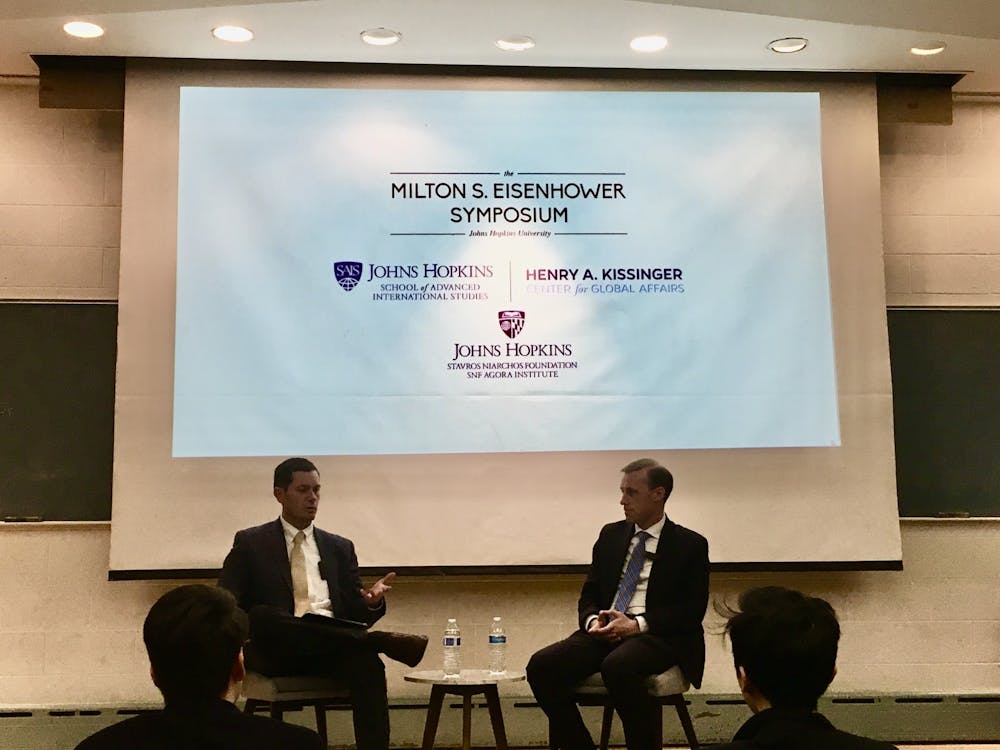The Milton S. Eisenhower Symposium (MSE) brought Jake Sullivan to the University on Wednesday to discuss the most pressing issues in American foreign policy. The lecture was part of a collaboration between MSE and the Stavros Niarchos Foundation Agora Institute.
Sullivan is an American policymaker with a distinguished career in public service. In 2016, he was the senior policy advisor on Hillary Clinton’s presidential campaign, where he was in charge of her debate preparation. It was widely believed that had she won, Sullivan would have gone on to be America’s National Security Advisor.
Sullivan was the Deputy Chief of Staff for Clinton when she was the Secretary of State. He was also former Vice President Joe Biden’s top security aide.
Freshman Isabel Veloso was interested in hearing Sullivan speak because she was eager to get an insider’s perspective on the development of foreign policy.
“It’s cool to get someone on the inside because you don’t hear about foreign policy a lot. You hear about the news but not the strategies behind it,” Veloso said.
Sullivan discussed what he believes the Obama administration did well. Specifically, he said that the administration recognized that the U.S. would have to exercise strong leadership to help solve problems that other countries could not solve on their own.
He gave some examples of successful uses of this strategy, including the response to the Ebola crisis and the 65-nation coalition against ISIS.
“The legacy of his administration in coming up with flexible, creative coalitions and more ad-hoc arrangements to address big global problems not only is a harbinger but actually produced general successes. It was a way of leveraging American power of both the material kind and convenient kind to pull together these flexible, sometimes universal and sometimes more localized, efforts,” Sullivan said.
Sullivan believes that Americans voted for U.S. President Donald Trump because they were hoping for change.
“I think the ‘Trump Doctrine’ can be summed up in a sentence, which is essentially: ‘The world has been laughing at us, and it’s time for us to make them stop.’ Trump believes that everything that the United States did from the Second World War to 2016 was designed to help other countries succeed and reduce the overall American prestige and power in the world,” Sullivan said.
He went on to explain four ways the Trump Doctrine has manifested in American society. These include the Trumpist beliefs that allies are more of a burden than a benefit for the United States; values have no place in American foreign policy; the United States should deal with other countries bilaterally rather than multilaterally; and that other countries’ safety limits the strength of the United States.
Sullivan argued that the four elements of the Trump Doctrine are the wrong tack for American foreign policy but that Trump’s take on trade policy is correct.
Sullivan also discussed recent controversies surrounding the impeachment hearings. He also discussed more general Democratic critique of the Trump administration.
“What used to be considered mentalities will now be the core Democratic message, that it’s better to have friends than not. And there are bad people and bad leaders in the world, and we shouldn’t be kissing up to them. Trump has mistaken many of America’s adversaries as his buddies for personal interest. I think the narrative will be very much about the construct,” Sullivan said.
Sullivan concluded his talk by contending that other countries have lost respect for the U.S. following recent controversies surrounding Trump.
Freshman Dominique Varier explained that he attended Sullivan’s talk because he wanted to learn about the evolution of America’s foreign policy.
“Especially in the past decade, whether it has been Bush to Obama to Trump, it’s been a rapid change in U.S. foreign policy,” he said.
Senior Elliot Seckler said that he found Sullivan’s talk significant for shedding light on the role of foreign policy in American politics.
“The two interplay,“ Seckler said. “The public and foreign international policy communities actually are intertwined.”
Correction: The original version of this article mistakenly referred to Senator John McCain, instead of Sullivan, as Clinton’s Deputy Chief of Staff.
The News-Letter regrets this error.





